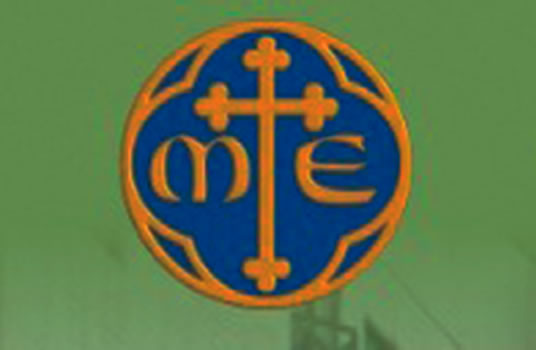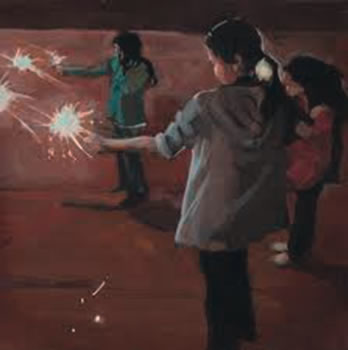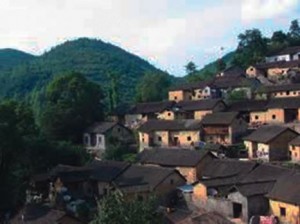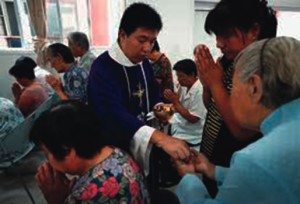China: Growing up in China (Part 1)
 Remarks recorded by Fr Bernard Jacquel, MEP taken from “Missions Etrangeres de Paris” May 2014.
Remarks recorded by Fr Bernard Jacquel, MEP taken from “Missions Etrangeres de Paris” May 2014.
He comes from the north of China, but we will not mention any locality. Although it is not customary where he comes from, neither among Christians nor in his family, to use baptismal names, we will give him his: Joseph. He was born in 1980, he was ordained priest in 2008 for the service of his diocese. Four months later he arrived in France. He is finishing his studies in theology. He plans to go back home next July.
"My family has been Christian for more than one hundred and fifty years. I know that because a few years ago we had to move our family tombs. When they had been built, they were out in the open on a slope on one of the two hills which could be seen from our house standing out from the distant mountains to the north. Veneration and respect for ancestors remain of great importance for us. Progressive urbanisation of the district had forced us to find another appropriate place for our dead. When we exhumed their remains we found rosaries and medals on them, which showed us the antiquity of our Christian links.
The moving of the tombs was the occasion of a celebration: there was music, firecrackers were detonated – indeed yes! Firecrackers! Your Christian celebrations in France are very beautiful, moderate ..... we like ours to bubble over and go with traditional signs of jubilation: bells, certainly, but also noisy music, and at the time of important feasts, at the moment when everyone in the church is chanting “Gloria”, outside there is the rattling sound of bursting firecrackers. This traditional racket has become for us Christians an expression of our joy and praise ... and a way of telling the whole neighbourhood that we are having a festival ... and we even invite some civic officials, some come quite willingly. According to old superstitious beliefs, this noise is quite appropriate for driving away the evil spirits.
On the subject of good and evil spirits and those unreasonable fears that infest people’s minds, here is a little incident I remember from about fifteen years ago. I was twenty years old, I was a seminarian, and went regularly to a parish to which I was attached. There was a Christian family there – it was known to be such because its members had been baptised, but none of them practised any more. It happened that I was made welcome in their home. The father was the headman in the village, a position of authority accredited by the Communist Party. He had a son of my age who led a fairly dissipated life. Now this young man, one night, while outside, was struck by the cry of a bird of ill-omen! He panicked, and when he got back to the house, he couldn’t speak a word, he howled like a madman. The father, outside, let off fireworks to drive the evil spirit out of his son.
Some neighbours alerted the parish priest, who came with his holy water and sprinkler... The ceremony over, the young man became calm again, he was cured. Since that time, each day, the father has taken part in evening prayers in the church. The mother, who has no need to work for her living and has a lot of free time, uses it serving the community: she has become one of the most active and devoted members of the parish.
After I became a deacon, I spent the holidays in a rural parish about 100 kilometres from my home. A mountainous area, with poor soil, hardworking people, businesses producing pharmaceuticals, and polluting cement works. At the time of the lunar new year, the holidays last a whole month for school-pupils and students, and I spent those holidays in that parish. On the evening before the first day of the lunar year, the Christians gathered in the church for mass. This night-time mass was offered for the dead, the ancestors. It attracts a bigger congregation than Christmas or Easter.
Following tradition, on this first day of the moon, people stay in their own homes. From the second to the fourth days visits are made or received. But on the fifth day, no more of that – people say that that day is the visiting- day for the evil spirits! But on this fifth day, the Christians gather in great numbers at the parish church: songs, mimes, playlets, dances, presentations of Gospel scenes...Formerly all that occurred in the church-yard, but more recently went inside for reasons of comfort: it’s winter, isn’t it? At first the old people protested: What? Dancing in the church? Making a spectacle of yourselves in front of the Blessed Sacrament? Eventually they were convinced. After all, hadn’t David danced in front of the Ark?
In the village where I was born, everyone knew each other. During my childhood it sheltered ordinary country people who cultivated fields and gardens. Up to about ten years ago, people maintained orchards, apple trees, walnut trees. It’s a region with a continental climate, with cold winters. Water is abundant there, it flows everywhere. But, alas, this inheritance from the water is now seriously harmed because of industrial pollution, which demands concern. At present people are employed in many factories which have been set up in the region. 
The former parish church had been confiscated in the 1950s. For 30 years no communal prayer had been possible, even in the home, for fear of denunciations, no reading of the Bible, no sacraments, nothing. One of my paternal grand-uncles had hidden the religious books: they had been discovered and taken away to be burnt. In the village it was known who was Christian, and from knowing their customs, they had forced labour imposed on them on Sundays: working the soil, clearing away snow in winter... It was the time of the Cultural Revolution and the Red Guards ( 1966 – 1976). The people most spied on were the richest, the literate and the Christians. My family was Christian and well off, my great- grandfather was a doctor and ran a traditional pharmacy, he owned land and was known to be the friend of several priests, so he was particularly spied on.
At the beginning of the 1980s, the time when I was born, Christians could once again gather. Someone had rediscovered a prayer-book, a lay-people’s massbook which had escaped the destruction. It was copied by hand, many people sharing the task.... (the teaching of writing during the period of the Cultural Revolution had been completely neglected. .The activity of the literate had been limited to copying Communist slogans to be stuck on walls.)
In these same 1980s those who were known to be priests – they were few- were watched and liable to police harassment when they were not being cruelly treated.
During the week our gatherings took place both morning and evening: on Sundays four times in the day, at six and ten a.m. and at three and eight pm.
The priest came when he could, and no-one was warned of his coming. He did not necessarily come on Sundays, he would appear at the time of one of the gatherings for prayer during the day. When he wasn’t there on Sunday, a man in charge of organising worship, led what I call a Mass of desire."
(Translated by Fr Brian Quin s.m.
To be continued)
 Entries(RSS)
Entries(RSS)